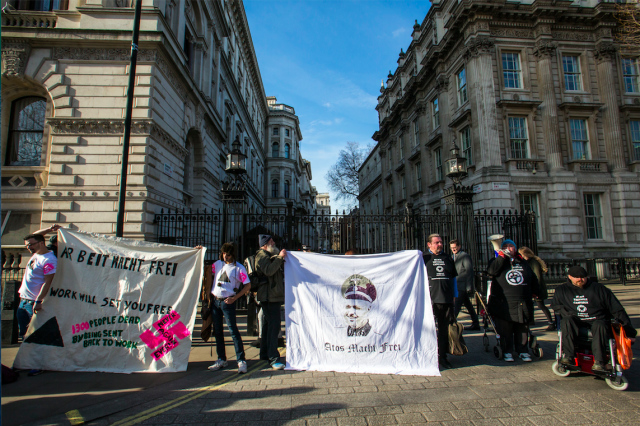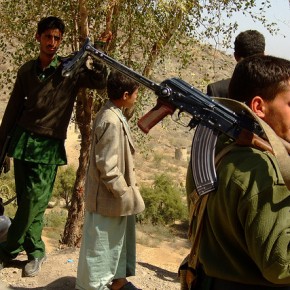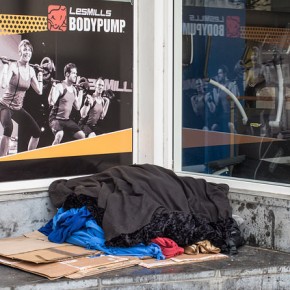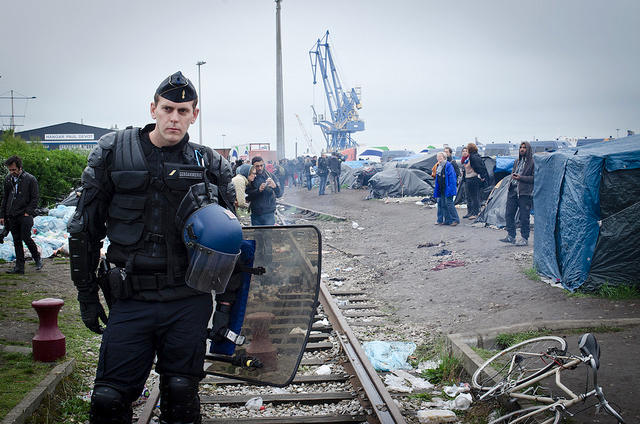Disabled activists today stood outside 10 Downing Street and the Houses of Parliament to remember the disabled victims of the Nazi Holocaust on the 70th anniversary of the liberation of Auschwitz. The protest-vigil also stood to highlight current injustices such as the approximate 1,300 people judged fit for the Work Related Activity Group, and later died of their illnesses to condemnation from the medical community, under the coalition government’s austerity regime.
Disabled People Against the Cuts (DPAC), Black Triangle Campaign, and Never Again Ever! held a banner with the words Arbeit Macht Frei – “work sets you free” – 1,300 died by being sent back to work’ (5). These 1,300 people were deemed fit to work but were clearly unfit to work and denied state support – then later died (6). The Nazis believed that human beings only have value if they can work and bring economic benefit for the ‘community.’ Those who were too sick, weak or disabled to work were murdered immediately, and fit members of persecuted groups such as Jews, Roma, Communists, and LGBTQI people, were deliberately worked to death.
As protester Yehuda Bauer said, “I come from a people who gave the world Ten Commandments. After the Holocaust I believe there should be three more: Thou shalt not be a victim. Thou shalt not be a perpetrator and thou shalt never, never, be a bystander.” Our protest today was in the spirit of Kiddush Hashem. By opposing the ‘othering’, scapegoating and marginalisation of disabled people who are being oppressed and persecuted in the name of neoliberal cuts and austerity in today’s Britain, we believe that we are honouring the memories of all who perished. We stand in solidarity with the oppressed, including those pushed to the brink by relentless budget-cuts, and together we say loud and clear to this generation: “Never Again Ever!”

I have been inspired by activists like Andy Greene, on the steering group for Disabled People Against the Cuts. He said, “this quiet and respectful protest-vigil joined descendants of the Holocaust with our community to remember all those have died in genocides around the world and as the result of so-called ethnic cleansing; and organise for human rights for everyone today. We demand a Right to Independent Living and Self-Determination. The vigil is to highlight the ideologies and policies that create the preconditions for genocide: discrimination and othering of minorities, the devaluing of human lives, the belief that the needs of the individual should be subjugated to the priorities of the state.” The Shoah must remind us to bring our love of life to the fore, just as much as we mourn its horror. I wish to celebrate life, and fight for a better world, standing with survivors and activists of every variety.
It was disturbing to hear John McArdle from Black Triangle say, “without a hint of irony Ian Duncan Smith has used the words ‘Work Sets you free’ to justify his so-called welfare reforms.” We as activists, who remember the bloodshed that characterized the Holocaust, certainly believe that the Shoah compels us to confront the preconditions for authoritarian violence wherever they appear. I am reminded of Ruth Barnett, Holocaust survivor and activist with Never Again Ever! who said, “as a former Kindertransport child rescued by Britain from almost certain death at the hands of the Nazis, I stand up for and speak out for all peoples who have suffered persecution that has not been brought to justice. It grieves me that there is so much focus on the 70th anniversary of the end of WWII and the Holocaust while the centenary of the Ottoman Genocide also this year is being overlooked. There is evidence to suggest that the Holocaust might have been prevented if impunity for it had not been created by failure to bring that previous genocide to justice and closure.”
So many groups were persecuted and murdered by the Nazis. It is essential that we remember them all. Nobody owns the discussion around the Holocaust – but we all own the responsibility to take action today to highlight discrimination and persecution wherever it happens. My grandparents’ experience instilled in me the idea that grave injustice exists in the world. As a result, it’s my duty to them and others to facilitate discussion and action in making sure we challenge oppression everywhere we see it. We believe that memorialisation without action is part of the problem. The 70th anniversary of the liberation of Auschwitz-Birkenau is as good a time as any to deliver that message.
Photographs courtesy of the author.





